Due to popular demand, I felt it was necessary to write this article. AccessOMFS has received numerous emails, comments, and contact requests seeking information on how foreign-trained dentists can apply to and match into an oral surgery program. Although it will not be relevant to the majority of readers, I felt it necessary to create this page as a base for discussion. I was a domestic applicant, so I am not going to act as if I intimately know the process or have any exceptional insights. With that being said, I intend for this page to be a work in progress. Because of this, I highly encourage any foreign-trained dentists that are applying or have applied to oral surgery programs to post their questions here and answer any that you may know.
Where to Begin?
The first thing you should know as a foreign dental applicant is that your journey will be tough. I do not mean tough as in it is tough to match into oral surgery. I mean your chances of being a foreign-trained dentist and matching into an American oral surgery program will be next to impossible. Although some nationalities, such as Canadians, will have an easier journey, overall it is very unlikely that this will happen. Frustrating to many applicants, this has little to do with your perceived training or skill level. The simple fact that you are not a U.S. citizen sets up many barriers to your ability to apply and match. Do not take these statements personally. It is merely the way it is, and I begin by saying these things because I want to emphasize the difficulty of the process. If you are still committed against the odds, then I wish you the best.
The Foundation
As a foreign-trained dentist, you are going to be fighting an uphill battle. Matching into an oral surgery residency is very difficult and competitive, even for domestic graduates. This means as a foreign graduate you are going to have to do what domestic graduates do on the CBSE, class rank, research, interview ability, and extracurricular activities better than the other applicants. This is simply to be noticed. Because I have covered the CBSE and other application musts in other areas of the website, I will not repeat them here. Consider your first goal as being the absolute best applicant based on those objective measures. If you cannot do that, then overcoming the other barriers as a foreign graduate will not happen.
Primary Barriers
In no particular order, here are the many common barriers to foreign-trained dentists applying:
- Program directors
- Medical schools
- Many require a U.S. bachelors degree
- Residency requirements (citizenship, visa, etc)
- English language ability/communication skills
- Unfamiliarity with or inability to judge a foreign program’s quality of education
- Direct or indirect xenophobia (not advocating, merely acknowledging its existence)
This may seem like a relatively small list of barriers, but it only takes one to make you ineligible. Unfortunately, nearly all of them are beyond your control. For instance, a program director may not take foreign graduates based on a personal policy. Nothing is stopping him or her from doing so, and in those cases, there is nothing you can do either. I would wager that there are a large number of programs in which this is the case. Additionally, six-year programs may be more difficult to apply to than four-year programs because of medical school requirements. These tend to be a combination of residency and education requirements such as having a U.S. accredited bachelor’s degree at minimum. This can come into play if you are a foreign-trained dentist who came back and received an accelerated U.S. dental degree. Despite the U.S. dental degree, medical schools will still not accept you without the U.S. undergraduate degree.
Other difficulties include language requirements and communication skills. Speaking English fluently is a must. There is simply no way around this. Many programs require an acceptable TOEFL (Test of English as a Foreign Language) or IELTS (International English Language Testing System) score. These will differ program-to-program limiting your application unless you have taken both tests. I have received more than a fair share of emails inquiring about oral surgery programs from foreign-trained dentists that are barely decipherable. The simple truth is that if you fall into this category then your English is not sufficient enough to match at a program. Before you consider this unfair, there are many practical reasons for this including writing notes, consenting patients, and communicating with your team. These obvious reasons are the same ones why I would never be able to practice in Russia or any other country where I don’t know the language. Fortunately, language ability is one area that is under your direct control. Want to match in a program here? Make sure your English is good enough that no one would ever guess that it is your second language.
An unfortunate wall that stands between a foreign-trained graduate and matching is prejudice. This may be direct or indirect and related to all kinds of different attitudes. Much of this is related to the belief that U.S. programs should preference U.S. graduates. I am not going to dive into the details discussing xenophobia, prejudice, and other forms of bias as it is not the purpose of this website. The only advice I give is to be as nice and respectful as possible always. If you notice a program is rude or has a culture of prejudice against you, why would you want to be there?
The Good News
If anything is working in your favor, it is the fact that there are programs that accept foreign applicants, at least in writing. I am unaware of the programs that consistently take foreign graduates so I am hesitant to name any single program. If you are dedicated, programs can be searched using the PASS search web tool. Below are screenshots of the Tufts page and how the information is presented.
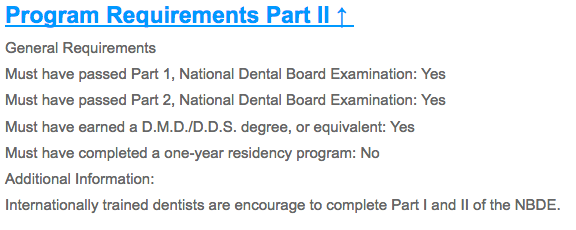
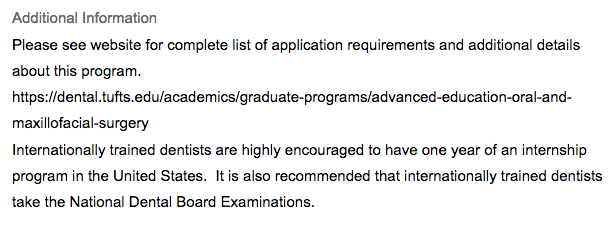
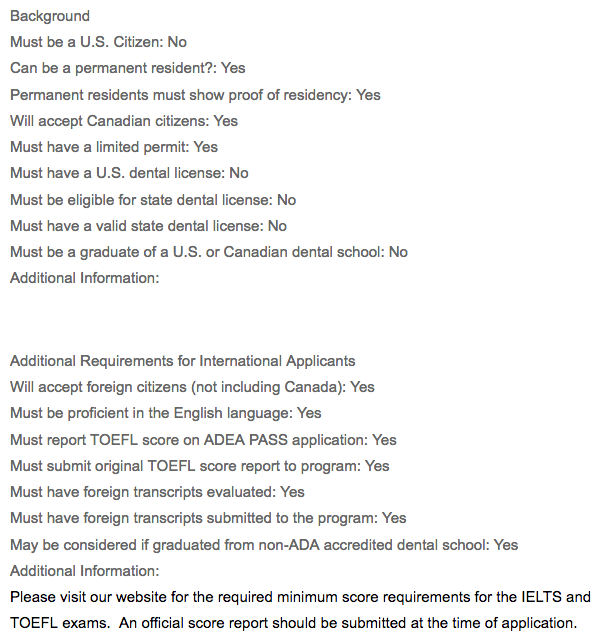
Additionally, per the AAOMS and CODA standards, international applicants can be accepted into a program as long as their education is equivalent to a U.S. accredited dental program. The statement is left ambiguous, and it appears to be up to the program to determine equivalency. Canadian programs are eligible. Below are screenshots of the statements.
CODA Statement
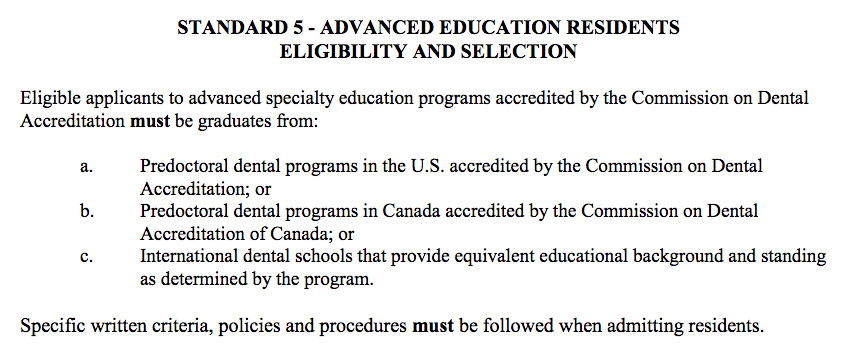
AAOMS Statement
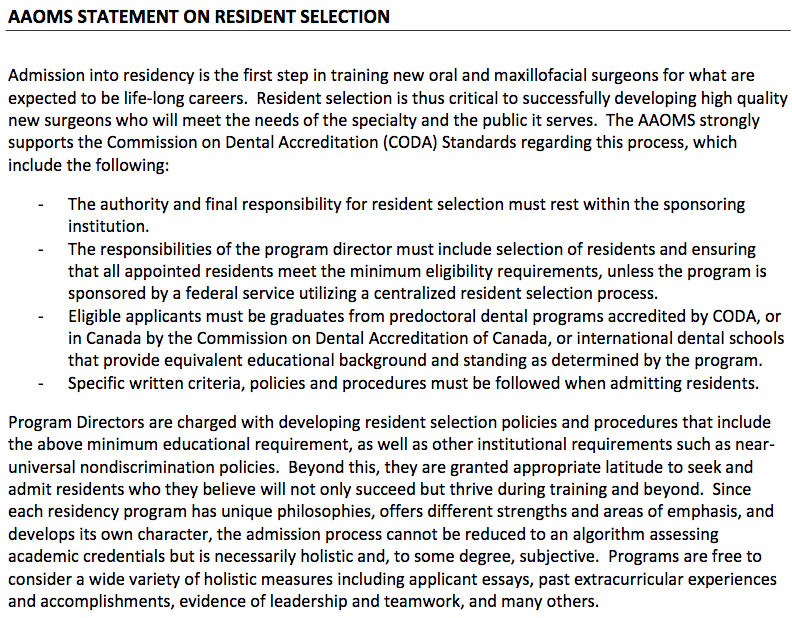
What’s Next?
You have positioned yourself as a top applicant with superb CBSE scores, top-of-the-class rank, and community involvement that would make Gandhi blush, so what is next? I would encourage you to research each program individually and reach out to program directors. You can save a lot of time and effort by communicating with them as they can quickly give a yes or no as to whether they accept foreign applicants. Once you compile your list of programs, make sure the other boxes of your application are checked. Are you fluent in English? Do you have a plan for residency? Can you afford to move? Are you committed? Once you believe all of these are completed and that you are a competitive applicant, apply broadly to every single program that you found to accept foreign trained dentists. Also, if you theoretically match, will you return to your country to practice or stay here? If you stay here, do laws allow you to practice? There are many questions like this that must be answered. As mentioned earlier, your journey will be much more difficult than the standard OMFS applicant. Are you prepared for it?
This page is a work in progress. I will update and expand as I receive more information from resources online and from readers like you. If you are a foreign trained dentist or know one that has applied or matched, please contact me via the contact page. Any contributions are valuable, and it would be nice to be able to build this page from your experiences. Thank you in advance!
